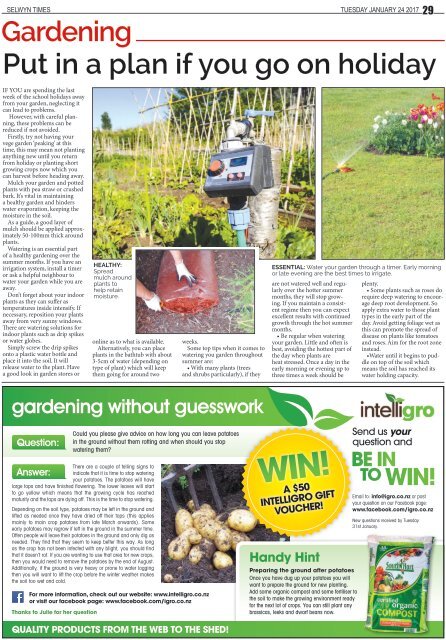You also want an ePaper? Increase the reach of your titles
YUMPU automatically turns print PDFs into web optimized ePapers that Google loves.
SELWYN TIMES Tuesday <strong>January</strong> <strong>24</strong> <strong>2017</strong> 29<br />
Gardening<br />
Put in a plan if you go on holiday<br />
IF YOU are spending the last<br />
week of the school holidays away<br />
from your garden, neglecting it<br />
can lead to problems.<br />
However, with careful planning,<br />
these problems can be<br />
reduced if not avoided.<br />
Firstly, try not having your<br />
vege garden ‘peaking’ at this<br />
time, this may mean not planting<br />
anything new until you return<br />
from holiday or planting short<br />
growing crops now which you<br />
can harvest before heading away.<br />
Mulch your garden and potted<br />
plants with pea straw or crushed<br />
bark. It’s vital in maintaining<br />
a healthy garden and hinders<br />
water evaporation, keeping the<br />
moisture in the soil.<br />
As a guide, a good layer of<br />
mulch should be applied approximately<br />
50-100mm thick around<br />
plants.<br />
Watering is an essential part<br />
of a healthy gardening over the<br />
summer months. If you have an<br />
irrigation system, install a timer<br />
or ask a helpful neighbour to<br />
water your garden while you are<br />
away.<br />
Don’t forget about your indoor<br />
plants as they can suffer as<br />
temperatures inside intensify. If<br />
necessary, reposition your plants<br />
away from very sunny windows.<br />
There are watering solutions for<br />
indoor plants such as drip spikes<br />
or water globes.<br />
Simply screw the drip spikes<br />
onto a plastic water bottle and<br />
place it into the soil. It will<br />
release water to the plant. Have<br />
a good look in garden stores or<br />
HEALTHY:<br />
Spread<br />
mulch around<br />
plants to<br />
help retain<br />
moisture.<br />
online as to what is available.<br />
Alternatively, you can place<br />
plants in the bathtub with about<br />
3-5cm of water (depending on<br />
type of plant) which will keep<br />
them going for around two<br />
weeks.<br />
Some top tips when it comes to<br />
watering you garden throughout<br />
summer are:<br />
• With many plants (trees<br />
and shrubs particularly), if they<br />
ESSENTIAL: Water your garden through a timer. Early morning<br />
or late evening are the best times to irrigate.<br />
are not watered well and regularly<br />
over the hotter summer<br />
months, they will stop growing.<br />
If you maintain a consistent<br />
regime then you can expect<br />
excellent results with continued<br />
growth through the hot summer<br />
months.<br />
• Be regular when watering<br />
your garden. Little and often is<br />
best, avoiding the hottest part of<br />
the day when plants are<br />
heat stressed. Once a day in the<br />
early morning or evening up to<br />
three times a week should be<br />
plenty.<br />
• Some plants such as roses do<br />
require deep watering to encourage<br />
deep root development. So<br />
apply extra water to those plant<br />
types in the early part of the<br />
day. Avoid getting foliage wet as<br />
this can promote the spread of<br />
disease on plants like tomatoes<br />
and roses. Aim for the root zone<br />
instead.<br />
•Water until it begins to puddle<br />
on top of the soil which<br />
means the soil has reached its<br />
water holding capacity.<br />
gardening without guesswork<br />
Question:<br />
Could you please give advice on how long you can leave potatoes<br />
in the ground without them rotting and when should you stop<br />
watering them?<br />
There are a couple of telling signs to<br />
Answer: indicate that it is time to stop watering<br />
your potatoes. The potatoes will have<br />
large tops and have finished flowering. The lower leaves will start<br />
to go yellow which means that the growing cycle has reached<br />
maturity and the tops are dying off. This is the time to stop watering.<br />
Depending on the soil type, potatoes may be left in the ground and<br />
lifted as needed once they have dried off their tops (this applies<br />
mainly to main crop potatoes from late March onwards). Some<br />
early potatoes may regrow if left in the ground in the summer time.<br />
Often people will leave their potatoes in the ground and only dig as<br />
needed. They find that they seem to keep better this way. As long<br />
as the crop has not been infected with any blight, you should find<br />
that it doesn’t rot. If you are wanting to use that area for new crops,<br />
then you would need to remove the potatoes by the end of August.<br />
Additionally, if the ground is very heavy or prone to water logging<br />
then you will want to lift the crop before the winter weather makes<br />
the soil too wet and cold.<br />
for more information, check out our website: www.intelligro.co.nz<br />
or visit our facebook page: www.facebook.com/igro.co.nz<br />
Thanks to Julie for her question<br />
WIN!<br />
a $50<br />
INTEllIgrO gIfT<br />
VOuchEr!<br />
handy hint<br />
preparing the ground after potatoes<br />
Once you have dug up your potatoes you will<br />
want to prepare the ground for new planting.<br />
Add some organic compost and some fertiliser to<br />
the soil to make the growing environment ready<br />
for the next lot of crops. You can still plant any<br />
brassicas, leeks and dwarf beans now.<br />
Send us your<br />
question and<br />
BE IN<br />
TO WIN!<br />
Email to: info@igro.co.nz or post<br />
your question on our Facebook page:<br />
www.facebook.com/igro.co.nz<br />
New questions received by Tuesday<br />
31st <strong>January</strong>.<br />
QualITy prOducTs frOm ThE WEB TO ThE shEd!


















